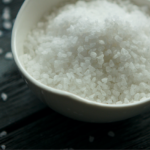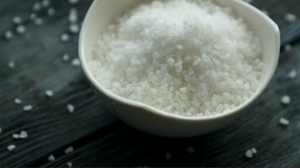 Water fluoridation is the addition of fluoride to the general water supply under the guise of helping to prevent tooth decay.
Water fluoridation is the addition of fluoride to the general water supply under the guise of helping to prevent tooth decay.
What IS fluoride?
Fluoride is a salt of hydrofluoric acid compound containing fluorine, as methyl fluoride, CH 3 F.
For those of us that didn’t excel in science class that definition did not help on clarity. This just leads us to yet another question. What is Fluorine? It is the most highly reactive nonmetallic element on the chart. It is a pale yellow toxic gas that is corrosive. This leads me to the next logical question. Can a toxic gas really be good for us and where and what exactly does the fluoride we are adding to our water supply come from?
The idea of adding it to the water supply was proposed based on the idea that fluoridated water works on tooth surfaces: inside the mouth it creates low levels of fluoride in saliva, which reduces the rate at which tooth enamel de-mineralizes. It also increases the rate at which it remineralizes in the early stages of cavities leaving fewer cavities overall. Sounds good right? Of course, it does. We bought it hook line and sinker up until recently.
According to the National Health Federation as well as the New York State Coalition, they are both highly opposed to Fluoridation. Though yes, Fluoride exists in nature and is found in rock it is also laced with an industrial waste product known as fluosilicic acid. Fluoride is a pollutant.
Fluoride is a by-product of copper, iron and aluminum manufacturing. The problem became how to legally dump fluoride. One of America’s largest aluminum companies founded a study and suddenly the problem was solved in the 1930’s. The outcome was found that fluoride helped prevent tooth decay.
Now the marketing began
A successful public relations effort along with government agencies resulted in the propaganda being spread far and wide: this miracle chemical, when added to water supplies, will give everyone healthy teeth.
The fertilizer industry may have solved their issue of what to do with their toxic waste product, but public health and safety took a hit. This claim that this fluoridated water was healthy for teeth is false. Evidence shows fluoridation does not reduce tooth decay. A tooth decay epidemic is rampant in the U.S. today, reports the Surgeon General and cavity crises are occurring in many, if not all, fluoridated cities and states in 2018. Many cities are now rethinking and removing fluoride from their water supplies.
The first experimental city to accept fluoridated water happened in 1945 in Newburgh, New York. The study was originally slated to last 10 years but ended at only 5, and was somehow falsely declared a success.
No adults were studied. Children sick two weeks before examination were excluded – eliminating the very children who might have been exhibiting fluoride’s adverse effects. In this study, they used sodium fluoride, which is not the fluoride chemical used by over 91% of U.S. fluoridating communities today – Silicofluorides.
According to www.fluorideinfo.org they state that “While the opponents to community water fluoridation may be well-intentioned, there is no scientific basis on which anti-fluoridationists base their claims.” This is simply not the truth.
This missmatches findings by Dr. Barry Groves, Ph.D. who dedicated himself to exposing dietary misinformation, the very studies were done by the WHO (World Health Organization) were greatly exaggerated and even falsified. It has been shown in countries such as Denmark, Finland, and Sweden when fluoride was removed from the water, the incidence of cavities actually reduced.
Fluoride is a highly toxic substance, which before named a cavity fighter, was used in rat poison and insecticides. If all of these years we have been duped, what has all this fluoride we have been consuming really done to our bodies?
Ironically, when you consume too much fluoride your teeth can actually discolor and crumble. In lab tests on animals, fluoride has been shown to enhance absorption of aluminum, which has been shown to cause Alzheimer’s. It has also been linked to osteoporosis, damage of the musculoskeletal and nervous systems, leading to limited joint mobility, ligament calcification, muscular degeneration and neurological deficits. But worst of all fluoride has been linked to as many as 10,000 cancer deaths per year (the majority in bone cancer, primarily in men).
Fluoride has also been shown to lower intelligence in children. In one study 907 children age 8-13 were measured in retrospect to the amounts of fluoride in their environment. The developmental intelligence appeared to be hampered severely the younger the child was when high doses were administered.
Fluoride has also been shown to calcify the pineal gland. It regulates the production of melatonin, which regulates the onset of puberty as well as protecting us from damage on a cellular level from free radicals. In some cultures, the pineal gland is also believed to be what is thought of as the third eye, and our source of visualization and imagination.
We can only suggest limiting your continued exposure to fluoride as much as possible.
There are many good high-quality fluoride free toothpaste available, as well as opting to drink distilled or fluoride filtered water from a system that utilizes a special filter or reverse osmosis, is a huge boost for your health, no matter your age.
***Please read the information provided before purchasing any water filter. Most do not actually remove fluoride. Placing a filter on your showerhead is also a tremendous help as your skin when showering opens up its pores and allows fluoridated and chlorinated water to penetrate and absorb into your system.
There are also ways to remove fluoride from your body through internal cleanses, heavy metal detoxifications and chelation.
It’s up to you to decide if you feel fluoride is ok for you to ingest, we suggest you do some research and make up your own minds.
Chiropractor & Nutritionist in Fort Myers, FL.
 Chiropractic care is a safe, alternative treatment when applied appropriately. Chiropractic treatments help in dealing with the symptoms of many conditions. Are you going to wait for your symptoms to be felt, or are you going to prevent them before they start?
Chiropractic care is a safe, alternative treatment when applied appropriately. Chiropractic treatments help in dealing with the symptoms of many conditions. Are you going to wait for your symptoms to be felt, or are you going to prevent them before they start?
Dr. Jason B. Kaster, a chiropractor, and nutritionist in Fort Myers can help you and your family achieve their optimal health.



 What is a heart murmur? Common conditions can make your heart beat faster and that can lead to the onset of a heart murmur. They can happen if you become anemic or pregnant, have an overactive thyroid, a high fever, or high blood pressure.
What is a heart murmur? Common conditions can make your heart beat faster and that can lead to the onset of a heart murmur. They can happen if you become anemic or pregnant, have an overactive thyroid, a high fever, or high blood pressure. 
 Water fluoridation is the addition of fluoride to the general water supply under the guise of helping to prevent tooth decay.
Water fluoridation is the addition of fluoride to the general water supply under the guise of helping to prevent tooth decay. Chiropractic care is a safe, alternative treatment when applied appropriately. Chiropractic treatments help in dealing with the symptoms of many conditions. Are you going to wait for your symptoms to be felt, or are you going to prevent them before they start?
Chiropractic care is a safe, alternative treatment when applied appropriately. Chiropractic treatments help in dealing with the symptoms of many conditions. Are you going to wait for your symptoms to be felt, or are you going to prevent them before they start?


 Blood pressure
Blood pressure
 The answer is YES sugar can harm your heart when eaten in excess.
The answer is YES sugar can harm your heart when eaten in excess.